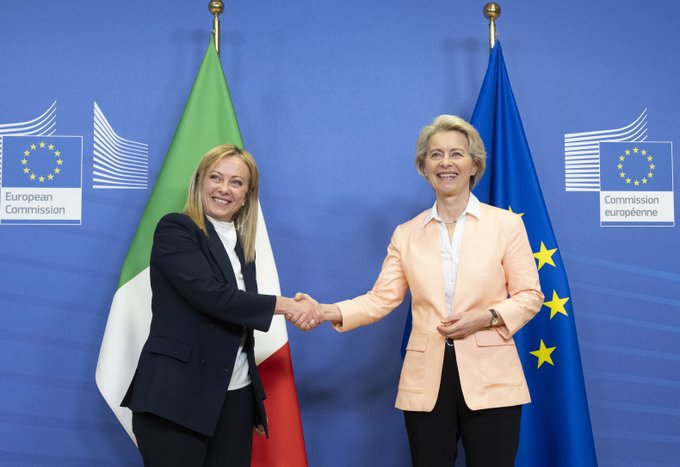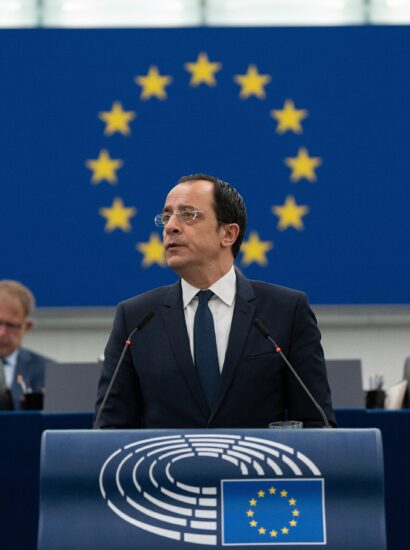A note from the editor: In this article, we refer to right-wing forces as populist or far-right, which we believe fits German political science professor Jan Werner Muller’s definition. Our definition of populism is purely descriptive and does not intend to make a political statement.
“A spectre is haunting the world: populism,” wrote Ghita Ionescu and Ernest Gellner in their 1969 collection of essays on populism. The two authors were considered the first to analyze comprehensively the phenomenon in the academic sphere.
Populism is one of the most studied topics in political science, as it is an ancient phenomenon in democratic systems. Usually seen as an extension of cheap demagoguery, populism has been a fairly persistent political phenomenon, appearing on both the left and the right. Left-wing populists are mainly found in the Americas, but some people also include Greece’s Syriza. In his 2017 book “What is Populism?”, Jan Werner Muller, a German-born professor of political science at Princeton University in the US, writes that not everyone who is considered populist in public discourse is a populist.
Muller tries to describe populism as it can be a threat to liberal democracy: “It is not the problem to criticize the elite in a democracy; everyone should pay attention to who is in power and what they are doing. But those who are not only anti-establishment but also anti-pluralism, who claim that ‘we and we only represent the people,’ are dangerous for democracy.”
A Deep Divide
As a guest of the scandalous National Conservativism conference in Brussels, I experienced how hostile the reaction was towards a “populist gathering.” The exaggerated reaction from the political left also shows us how deep the divide is between them and – to use their own expression – the sovereignist’s side.

Matthew Goodwin at the NatCon conference 2024 (Source: National Conservatism twitter account)
British star lecturer of political science on the “populist side,” Matthew Goodwin (who was also a main speaker at the mentioned event), claims that
the so-called liberal elite of the West should consider the reasons why so many Western voters are turning out to support national populists, as opposed to burying their heads in the sand, of trying to shut down populism.
He argues: “Across the West, academic studies consistently find that it’s left progressives who dominate the universities, schools, museums, galleries, publishing, the BBC, and more who are most likely to unfriend people whose political views they disagree with on social media and express discomfort if one of their relatives has a relationship with a Conservative, a Brexiteer, or, even Trump voter.”
Will 2024 Be the Year of the Populist Wave?
“While many left-leaning columnists and analysts comfort themselves by proclaiming we’ve reached ‘peak populism,’ a populist wave is coming, and it’s going to be bigger than anything we’ve seen so far,” Goodwin forecasts for the upcoming elections.
The last European Parliamentary elections in 2019 were supposed to be the first breakthrough for the populist right. It didn’t happen then; now, according to all the polls, we may observe a small leap forward, but not entirely a revolutionary change.
Goodwin projects this big turning point based on two key moments:
crises and other turbulent happenings are in favor of the populist parties in the core EU member states and of the republicans in US politics, and the far-right demographical gains among the young (under 35) voters.
AfD, the Party of the Young and the Immigrants?
The political scientist refers to a new German study which, according to him, proves “the contrary to what we’re often told about populism, that it only appeals to angry old people who will soon slip over the horizon, reveals how the Alternative for Germany (AfD) is recruiting considerable support from Gen-Z.”
Indeed, the figures of the “Youth in Germany 2024” say that
22 percent of the 2 000 young people aged 14 to 29 said they intended to vote for the AfD if they were able to vote in parliamentary elections right now.
That figure is more than double of what it was two years ago (merely 9 percent). On the contrary, the coalition parties have suffered significant losses: The Greens’ support among young people and young adults has fallen from 27 percent in 2022 to 18 percent. The proportion of center-left Social Democrats (SPD) decreased from 14 percent to 12 percent, whereas the Free Democrats (FDP) dropped from 19 percent to 8 percent. The opposition center-right CDU/CSU rose from 16 percent to 20 percent.
The study’s authors elaborated that “under-30s were increasingly disgruntled with their social and economic situation, and that fears about future prosperity were driving a shift to the right.” The AfD’s signature issue is a hardline anti-immigration stance, and the “data shows that migration is one of young people’s top concerns.”
As we wrote earlier, the AfD strongly holds the second place in regional elections and has made significant gains outside its traditional stronghold, Eastern Germany. The radical party improved its previous results in both Hesse and Bavaria.
Germany has to crack down hard on illegal immigration, as it became the No. 1 issue in the election campaign. Not surprisingly, the hard-right, anti-immigrant force can be attracted to these voter groups. The key is the unmanaged migration and the failure of Germany’s integration policy. “This dissatisfaction [with immigration policies] is apparently greater among some of the people with foreign roots living here than is their fear of the AfD,” weekly magazine Focus recently concluded.
Experts say there are several reasons for the affinity that some immigrant voters feel for this anti-immigrant party.
A worrying number of refugees agree with right-wing populist, authoritarian statements; many also support the AfD through the anti-vax movement and the party’s array of conspiracy theories.
But most of all, the immigrant voters have more material anxiety, which drives them to the far-right, their welfare. Middle- or lower-middle-class people worry about losing their material security. They want to pay less taxes and desire job security; newcomers are competition for them, especially in the country’s increasingly strained housing market.
🇩🇪 – Espionage scandals are hurting Germany’s far right
• Charges of Chinese & Russian influence are marring AfD’s campaign for European parliament elections
• Party’s support stood at just 16% on April 30th, down from 23% in December and far below CDU/CSU pic.twitter.com/PrweXDOT8b— Agathe Demarais (@AgatheDemarais) May 7, 2024
“The AfD has been very clever in the way it reaches out to immigrants, particularly the Russian Germans and those with a Turkish background,” a director of an anti-racism NGO, Sanem Kleff, told Foreign Policy. The first group consists of 2.3 million ethnic Germans who have emigrated to Germany from Russia since 1980. The AfD has been the only German party to address them. The second is a bigger and potentially growing group due to a recently passed dual-citizenship law. Many of the 3 million people of Turkish descent recall having to struggle to keep their heads above water in their new home country, not like the newly migrated Syrians, Afghans, etc, who receive various types of state aid. The goal is to attract these voters – which the entire party has not yet officially endorsed. On the contrary, party fundamentalists insist that the AfD and Germany as such must be ethnically homogenous, namely white, German, and Christian.
But by emphasizing an aversion to “Arabs” and not the larger category of “Muslims,” which would include most Turkish-background people, the AfD separates the two voter groups from each other and opens up a door for the latter.
Just as their popularity was rising, German nationalists must face up to their most serious lack of credibility. At the end of April, German police arrested a top European lawmaker’s aide who worked for the far-right Alternative for Germany (AfD) party on charges of spying for China. The identified staffer works for MEP Maximilian Krah, the AfD’s top candidate for the European Parliament election in June. Prior to the recent allegations against Krah, Petr Bystron, the party’s No. 2 candidate in the European election, was accused of accepting payments from a Kremlin-linked source. Both candidates deny wrongdoing, and hardcore supporters are also sticking with the party, viewing Krah as a victim of a grand conspiracy involving the mainstream media and the German state.
France: How to Make an Illiberal President?
In France, the Rassemblement National (National Rally, RN) party, led by Marine Le Pen, maintains a strong stance on national priority, promising native French preferential access to jobs, benefits, and social housing over foreigners. This aligns with Le Pen’s promise of preferential access to French citizens, a sentiment that has been echoed by Emmanuel Macron’s party as well. The subject was, of course, migration. Late last year, the Renaissance party introduced an immigration bill that bore a strange resemblance, in several parts, to the National Rally’s program. Parliament passed the bill with the support of Le Pen’s party.
France is divided over Le Pen’s respectability. Is far right, or nationalist right, a good way to describe them? For example, Eric Zemmour’s Reconquest party is much more radical than RN. However, in some aspects of its platform, Le Pen’s party can trace its origins back to her father, Jean-Marie. Like her comments about Muslims and immigrants border on Islamophobia: some recall her remarks about the “incessant demands of minorities” (2021), or the Muslim veils as an ideological marker “as dangerous as Nazism” (2022), ending birthright citizenship and forced repatriation of foreign-born criminals. This evidence of a radical anti-Islam agenda and her continued sympathy for Putin, who openly supports Le Pen, would present a threat to French voters. Apparently, it doesn’t.

Marine Le Pen at the RN assembly (Source: Marine Le Pen’s X profile)
According to Politico’s Poll of Polls data, the Rassemblement National has a comfortable lead ahead of Macron’s Ensemble coalition and the left-wing alliance. The RN and its lead candidate, Jordan Bardella, reached 31 percent, while the above two only scored an average of 15 percent (counting the margin errors).
At the last presidential election in 2022, people under 35 were more likely to vote for NR; Le Pen won 44 percent of the under 35s and the majority of the 25-34 age group, while only 30 percent of the over-70s voted.
Fear of Islam Could Drive Groups of Women and Gays Towards NR
Populists are now gaining momentum among women and gay people, many of whom perceive that their hard-won rights as women or same-sex couples are under threat from the rise of radical Islamism, Islam’s spread, and how the radical woke left is enabling it.
There is some evidence, for example, that Marine Le Pen is now polling far higher than she used to among young females – especially women without degrees – while academic studies now point to the growing visibility of gays and lesbians among national populist voters, many of whom understandably fear what the spread of Islam and the ongoing refugee crisis means for their hard-won rights.
Marine’s decade-long goal of rebranding his father’s party, The National Front, to the no longer a far-right populist force has come to fruition.
However, the fact that Le Pen shares political space with far-right parties does not help matters. She is a member of the European Parliament’s Alternative for Germany group, currently facing massive anti-far-right demonstrations throughout Germany. While Le Pen has rejected the reported plan discussed by some AfD figures to deport foreign-born Germans, citing concerns about the two parties’ shared membership in the Identity and Democracy group, she has not severed ties. On the contrary, Le Pen frequently appears alongside far-right allies in Italy, most notably Matteo Salvini, the Lega movement’s leader.
Populists Around Europe
Georgia Meloni has emerged as Italy’s largest party among those under the age of 35, with nearly half of all young Italians voting for either Meloni or Matteo Salvini, another national populist. The latest Euronews poll revealed that support for Meloni’s Brothers of Italy party remains stable at 28 percent. However, Salvini’s Lega scored only 8 percent of the vote among all voters. The poll also predicted that the center-left Democratic Party would finish second, followed by the long-considered left-wing populist Five Star Movement.

George Meloni and Ursula Von der Leyen (Source: Twitter)
With her strong home results, on the European level, Meloni is the driving force behind the European Conservatives and Reformers (ECR) group in the European Parliament.
According to observers, her goal is to hold the key to forming a grand center-right coalition with the European People’s Party, which is also sought by European Commission President Ursula von der Leyen.
“We want to create a majority that brings together the center-right forces and sends the left into the opposition even in the EU. It’s a difficult undertaking, but it’s possible, and we must try,” the Italian prime minister said. Needless to say, if Meloni were to take up a seat at the European Parliament, she would have to resign from office- a highly unlikely scenario.
In Austria, the Freedom Party is once again leading the polls, with 30 percent support among younger voters and 20 percent among older voters. However, in Spain, the national populist Vox has captured one in every three under 35s, while in Sweden, the share of the very youngest voters who support the Sweden Democrats has nearly doubled to 22 percent, making them the second most popular party among first-time voters. The far-right Vlaams Belaang in Belgium appears to be on track for significant gains.
Trump to Sweep the Latino and the Black Votes
In the United States, it is clear that the national populist electorate never remains static. Consider the growing number of Latino, Hispanic, and African American voters who are supporting Donald Trump, owing in part to their dissatisfaction with the woke left and their crime-ridden, low-income communities. All of this boils down to the fact that, contrary to popular belief, demography is not destiny.
The shift in opinion among one of the Democrats’ most dependable voting blocs is a bad sign for Joe Biden’s re-election chances.
In the 2020 election, he received 92 percent of the black vote, the highest percentage of any minority group in the country. However, growing disillusionment with the President’s first term and concerns about his age threaten to undermine the Democratic Party’s previously strong relationship with black voters.
A New York Times/Siena poll released in March found that Donald Trump now has 23 percent support among black voters, up 19 percentage points from October 2020 (scoring only 8 percent). Respectively, the young black voters moved a notable 22 percentage points toward Republicans. Inflation – a top issue for black voters that year – has since fallen, but food, gas and rent prices remain stubbornly high, which may encourage some to stay home in November. Trump also leads Biden by 46 percent to 40 percent among Latino voters, a 39 percentage point swing over the last four years (Biden won the Latino vote 65 percent to 32 percent in 2020). The Republicans are now leading in all seven swing states, and the election in November will be a test to see if he can hold onto these gains as the contest draws closer.
Populist Breakthrough Fails Due to Lack of Interest
Despite Goodwin’s predictions (“the continent looks set to be hit by a significant populist wave” in which “the center-left, the Greens and the liberal centrists look set for losses”), according to Politico’s latest poll, this is unlikely to happen. The center-right European People’s Party (EPP) remains at the top of the projections despite losing one seat and now standing at 174. They are followed by the center-left Progressive Alliance of Socialists and Democrats (S&D), projected to gain 145 seats. The centrist-liberal group, Renew Europe (RE), has 81 seats in total. The three parties, which form an informal coalition in the European Parliament, now have exactly 400 of the 720 seats, a comfortable absolute majority with three more seats than last month.
On the right side of the political spectrum, Identity and Democracy (ID) and the national-conservative European Conservatives and Reformists (ECR) are expected to gain 159 seats. The right-wing ID 85 – which means it is currently the third largest group – while the ECR has suffered a slight decline in its results, with only 74 seats.








[…] they dealing with the problem of immigration and the integration of Muslims? It’s clear that Marine Le Pen is an anti-Islamist, and some consider her to be Islamophobic. For this reason, she has not been able to break the […]
[…] even if Trump will decide to retire at some point, I don’t think that Trumpism – as a set of populist ideas – will disappear from the GOP. But I can definitely understand why people who see that as a […]